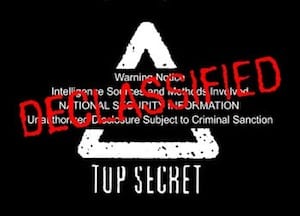Answering an audience member’s question at a July 22 Washington, DC event, Thomas H. Kean and Lee H. Hamilton — who were, respectively, the chair and vice-chair of the 9/11 Commission that published its report ten years ago this month—spoke in favor of making public 28 redacted pages in the December 2002 report of a joint House and Senate Intelligence Committees investigation of the September 11, 2001 attacks. Kean and Hamilton have thus endorsed the call in Rep. Walter Jones’ H.Res. 428 for the president to make public these pages of the congressional report that have been redacted for over 11 years.
Kean and Hamilton, along with the other members of their 9/11 Commission, also called this week for making public much of the classified documents related to their own commission’s investigation. The 9/11 Commission members’ follow-up report published last week states:
As we noted in The 9/11 Commission Report, complexity and over-classification produced an intelligence apparatus that in many respects “defie[d] public comprehension.” The report was valuable to the American people in large part because it included a tremendous amount of previously classified information—information about the 9/11 plot, the al Qaeda conspirators, and counterterrorism policy and actions in the Clinton and Bush administrations. The job of fully informing the American people is incomplete, however. The commission’s records, including summaries of our interviews and important intelligence and policy documents, are held by the National Archives. Some of those documents and records remain classified and are thus unavailable to the public. Authority to declassify those documents rests with the agencies that created them. Distressingly, little progress has been made by the National Archives and Records Administration (NARA) in encouraging the relevant executive branch agencies to declassify those records and documents. Ten years after the Commission closed its doors, scholars and the general public should be given broad access to these documents, absent a compelling national security justification for withholding a given record.

